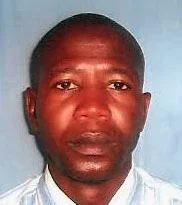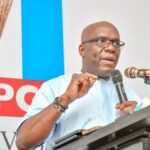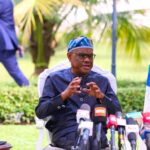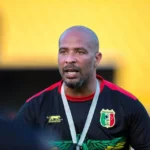Afolabi Gambari
By any standard of measurement, two-term former governor of Kano State and currently National Chairman of the ruling All Progressives Congress (APC), Dr. Abdullahi Umar Ganduje, qualifies to be called academic, his PhD having been well earned. Many may have, over the years, viewed the 74-year-old as a rank politician who has probably been in the sport all his life and done nothing else, even learning through the ropes before attaining the height he is perched in today. But no matter.
In the course of his political career, Ganduje must have proclaimed “democracy” innumerable times; if nothing, at least to give credence to his involvement in politics. Indeed, in all the campaigns he has been involved in since the return to civilian democracy on May 29, 1999, he has described himself as a democrat primed to advance the course of democratic development in Nigeria. Who could have faulted the description, anyway?
It would appear, however, that he has not meant what he said at every turn, especially with regard to democratic development.
On May 11 this year, Ganduje, apparently basking in the euphoria of being swamped on by unprincipled politicians who see their tomorrow in today and therefore desperately want to join the ruling party, even though they do not belong there, broke his democratic tenet when he declared that the large number of political parties in the country has created obstacles for effective democratic governance.
As an academic that he is, he knew he owed his listeners an adequate explanation for his comment. He did not, therefore, need to be asked for the explanation before willingly offering it. After first suggesting that a single-party system would streamline governance in Nigeria, he then cited China as an example of unified political leadership that drives development in a country.
The suggestion had got me curious. Ganduje, the academic, cannot deny knowledge of how China has evolved over the last six decades, especially about democracy. It is even more curious that he would call China’s brand of democracy, let alone ask Nigeria to embrace it. Nothing can be more curious than the argument he offered to back his pro-China call. Hear him: “If you look at China today, they operate a single-party system and are now a global leader in driving the development of their people.” To justify his stand, which, by the way, is not the stand of the ruling party, he appropriated the opinion of over 250 million Nigerians to say no one would object if the country opts for a single-party state. To seal this up, he said: “The APC would welcome the idea if all parties in Nigeria were to dissolve into the ruling party.”
It would be pretty difficult to know exactly what went on in the mind of Ganduje as he gleefully made his declaration. But it could still be gleaned that the next few months would witness a serious threat to democracy in Nigeria, considering the gale of defections from several other parties to the ruling party.
Ganduje has already supervised the defection of former Delta State governor Ifeanyi Okowa, who had contested the 2023 presidential election as the PDP vice presidential candidate. So too, he has supervised the defection of the incumbent Delta State Governor, Sheriff Oborevwori, who also contested for the post on a PDP card. It has to be said that the Delta defections are considered a massive blow to the opposition PDP and a massive advantage to the ruling APC ahead of the 2027 general election. It has not mattered that the reasons adduced for the defections are as spurious as they are infantile and are for mere self-preservation through and through. Never mind that Ganduje hailed it as “the essence of democracy”.
Yet, there was more to come. By May 13, all three PDP senators from Kebbi State defected to APC and were curiously herded to the State House, Abuja, to meet with President Bola Tinubu to “brief” him of their decision. A few minutes after, APC’s National Secretary, Malam Bala Ibrahim, in an excited mood, said the development indicated a change in how the public views the ruling party, suggesting that the senators defected on their own volition. He also said the senators’ action demonstrated that the APC’s policies “are in line with democratic principles and represent the impartiality and organisation necessary for a democracy”. Whether this assertion aligned with Ganduje’s call for a China-style democracy that is bare-faced dictatorship would be subject to debate, however. After all, every discerning and dispassionate observer knows that freedom of choice and expression are alien to China’s democracy.
For their defection, the three Kebbi senators, namely Adamu Aliero (Kebbi Central), Yahaya Abdullahi (Kebbi North) and Garba Maidoki (Kebbi South) appear to liken their action to winning the Olympic gold medal, considering how proud they were at offering their reasons. Aliero said he took his decision “after a deep reflection, extensive consultations and a careful assessment of the current political and socio-economic realities of the country and my constituency”, adding: “I made this move in response to a simple question that every responsible leader must ask himself or herself: what is best for the people I serve?” But he did not forget to describe himself as “a proud member of the PDP, a party under whose platform I was elected as a senator”. The phrase “a proud member of the PDP” can only suggest one thing: ‘If I don’t get what I want for defecting to APC, I will return to the PDP.’ Hopefully, Ganduje could read Aliero’s lips there. If he couldn’t, well, too bad.
For Abdullahi, his reason for dumping the PDP is simple: “to contribute my quota to the developmental strides of the President Bola Tinubu-led administration and that of Governor Nasir Idris of Kebbi.” It could only be imagined what he had been doing while carrying the PDP’s banner in the Senate.
Maidoki did not differ from Abdullahi. He merely infused a bit of clarification, saying: “I left the PDP due to the lingering crisis in the party and my belief that the ideals of the APC better align with my political aspirations. It will also enable me to participate fully in the renewed hope agenda of Mr. President.”
China’s democracy may not be the ideal type. But it is as certain as day and night that the ruling party in the Asian country will never welcome traitors in their midst. The party knows how to put traitors exactly where they belong. But that is by the way.
Meanwhile, Senate Leader and member of the APC, Opeyemi Bamidele, as excited as the party’s secretary, aforementioned, has said that “no one is being coerced into joining the ruling party”. He has also said: “It will not matter what party you belong to. What will matter to you is the overriding public interest.”
Rumours of defection already fill the air, and it is only a matter of time before all parties in Nigeria become one party as 2027 approaches. The question would then need to be asked by onlookers: Why are they defecting to the APC, and to what end?







